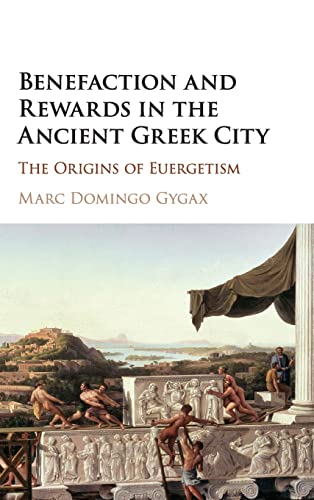All books / Book
Benefaction and Rewards in the Ancient Greek City: The Origins of Euergetism

| Full title: | Benefaction and Rewards in the Ancient Greek City: The Origins of Euergetism |
|---|---|
| ISBN: | 9780521515351 |
| ISBN 10: | 0521515351 |
| Authors: | Domingo Gygax, Marc |
| Publisher: | Cambridge University Press |
| Num. pages: | 333 |
| Binding: | Hardcover |
| Language: | en |
| Published on: | 2016 |
Read the reviews and/or buy it on Amazon.com
Synopsis
This Volume Presents For The First Time An In-depth Analysis Of The Origins Of Greek Euergetism. Derived From The Greek For 'benefactor,' 'euergetism' Refers To The Process Whereby Citizens And Foreigners Offered Voluntary Services And Donations To The Polis That Were In Turn Recognised As Benefactions In A Formal Act Of Reciprocation. Euergetism Is Key To Our Understanding Of How City-states Negotiated Both The Internal Tensions Between Mass And Elite, And Their Conflicts With External Powers. This Study Adopts The Standpoint Of Historical Anthropology And Seeks To Identify Patterns Of Behaviour And Social Practices Deeply Rooted In Greek Society And In The Long Course Of Greek History. It Covers More Than Five Hundred Years And Will Appeal To Ancient Historians And Scholars In Other Fields Interested In Gift Exchange, Benefactions, Philanthropy, Power Relationships Between Mass And Elite, And The Interplay Between Public Discourse And Social Praxis-- This Is A Historical Study That Adopts The Standpoint Of Historical Anthropology. I Do Not Mean By This That The Book Is Partially Based On The Work Of Social And Cultural Anthropologists Dealing With Gift-exchange. Instead, I Refer To The Approach To History From Which It Is Written. Specifically, I Seek To Identify--beyond Individual Cases And Exceptions--patterns Of Behavior And Social Practices Deeply Rooted In Greek Society And The Long Course Of Greek History. I Look For Regularities, Continuities And Rules Underlying A Wide Range Of Human Actions. My Goal Is Not To Isolate Ahistorical Features But To Analyze The Role These More Or Less Stable Elements Play In The Historical Process And How Their Articulation With More Dynamic Constituents Triggered Social Change. Simplification Is Inevitable In Such An Approach, But My Belief Is That In Historical Inquiry A Certain Degree Of Generalization Is Both Possible And Desirable. On The Other Hand, The Basis Of The Book Is Strongly Empirical. At This Level, I Have Tried To Avoid Simplification; The Reader Will Find Substantial Footnotes With Many References To Literary And Epigraphic Sources And Detailed Discussion Of Documents--provided By Publisher. 1. Synchronic Approaches -- 2. Creating An Institution -- 3. Continuity And Change (1) : Foreigners And Athletes; 4. Continuity And Change (2) : Citizens -- The Generalization Of Euergetism -- Epilogue: Sequence And Causal Relationships -- Index Of Passages And Inscriptions. Marc Domingo Gygax, Princeton University. Includes Bibliographical References (pages 259-291) And Index.